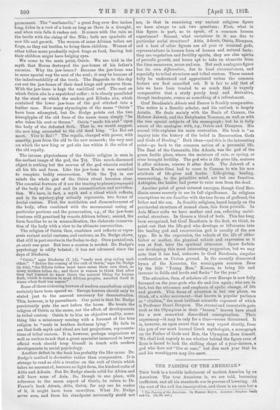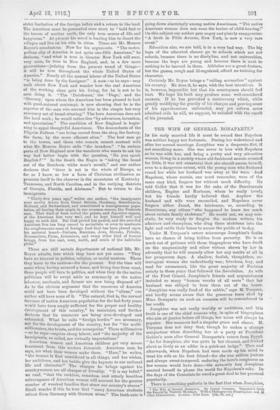THE PASSING OF THE AMERICAN.* THIS book is a terrible
indictment of modern America by an American. The true American is, we are told, becoming inefficient, and all his standards are in process of lowering. At the root of the evil lies immigration, and there is no cure but a • The.Paseitig of the.Ainartioan, By Monroe Boyce. London, Stephen Switti and Co. 18s. Od. not.] strict limitation of the foreign influx and a return to the land. The American must be persuaded once more to " hold fast to the bosom of mother earth, the only true source of life and happiness." At rresent his mood is leading him to desert the villages and live on his wits in cities. These are Mr. Monroe Royce's conclusions. Now for his arguments. "The metro- politan city of America is not quite one-fifth American," he declares, " and what is true in Greater New York will soon, very soon, be true in New England, and, in a few more generations—judging from the present trend of things— it will be true throughout the whole United States of America." Nearly all the manual labour of the United States "is being done by the foreigner." A man—so be says—may walk about New York and wonder how the real American of the working class gets his living, for he is not to be Been doing it. "The 'Dutchman,' the • Dago,' and the Sheeney,' upon whom the American has been pleased to look with good-natured contempt, is now showing that ho is the superior of the man who scorned him in the simple but very necessary art of bread-winning." The born American does not like hard work ; he would rather live "by adventure, invention. and speculation." The condition of New England is begin- ning to appal thoughtful Americans. The descendants of the Pilgrim Fathers " are being ousted from the shop, the factory, the farm, by the more efficient alien." The beat men go to the towns, and those who remain cannot contend with what Mr. Monroe Royce calls "the invaders." "In certain parts of New England now the wanderer who wants to ask his way had better begin with the question, ' Do you speak English I)" In the South the Negro is " taking the bread out of the Southern white man's mouth," and our author declares that "there is not in the whole of Europe, so far as I know, so low a form of Christian civilization as presents itself to the observer in the mountains of Kentucky Tennessee, and North Carolina, and in the outlying districts of Georgia, Florida, and Alabama." But to return to the immigrants.
"Thirty-five years ago," writes our author, "the immigrants wore mostly drawn from Great Britain, Germany, Scandinavia, 'Holland, and Switzerland, and constituted a homogeneous popu- lation, all having their origin in our common source, the Teutonic race. That kind of food suited the palate, and digestive organs, of the American lion very well, and he kept himself well and happy on such diet. But that period has passed, and the over-fed American lion has long ceased to assimilate or even to masticate the conglomerate mass of foreign food that has been placed upon his national board—Italians, Russians, Jews, Slovaks, Polacks, Roumanians, Finns, Armenians, and every other kind of human beings, from the east, west, north, and south of the habitable globe."
There are still certain departments of national life, Mr. Royce admits, into which they have not yet come. "They have no interest in politics, religion, or social matters. These they leave to the natives—for the present. But the time will come when, having secured a home, and living free from want, these people will turn to politics, and when they do the native politician will be swept aside as summarily as the native labourer, mechanic, and farmer are now being disposed of." As to the obvious argument that the resources of America could not have been developed without the "aliens," our author will have none of it. "The natural, that is, the normal increase of native American population for the last forty years would have been amply sufficient for the proper and healthy development of this country," he maintains, and further declares that its resources are being over-developed and exhausted. What he calla "foreign hordes" aro necessary, not for the development of the country, but for "the multi- millionaires, the trusts, and the monopolies." These millionaires --so hesays—require cheap labour, and "the majority of the Immigrants, so called, are virtually importations." American women and American children get very severe treatment from this modern Jeremiah. American men, he says, are what their women make them. "Here," ho writes, "the woman is first considered in all things, and her wishes, her ambitions, and her habits give the keynote to our national life and character." The charges ho brings against his countrywomen are all charges of frivolity. "It is my belief," we read, "that the reckless, senseless, and utterly heartless extravagance of American women will account for the greater number of wrecked families that strew our country's shores." Small wonder if this be true that " many American students return from Germany with German wives." The birth-rate is going down alarmingly among native Americans. "The native American woman does not want the bother of child-bearing." On this subject our author gets angry and plainly exaggerates: " A birth in Fifth Avenue, New York, is now a very rare event."
Education also, we are told, is in a very bad way. The big boys of the educated classes go to schools which are not schools, because there is no discipline, and not universities, because the boys are young and because there is next to nothing to be learned in them. Athletics are a great feature, but the games, rough and ill-regulated, afford no training for character.
Certainly Mr. Royce brings a. "railing accusation" against his country. He does it, he says, with the best intentions. It is, however, impossible but that his countrymen should feel hurt. We hope his book may produce some well-considered answers. If he has provoked a controversy which, while greatly modifying the gravity of his charges and proving some of his apprehensions unfounded, may yet reform some admitted evils he will, we suppose, be satisfied with the result of his jeremiad.







































 Previous page
Previous page